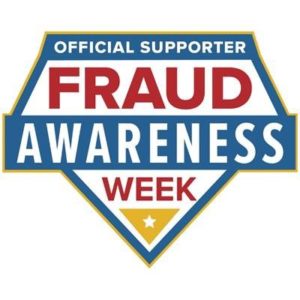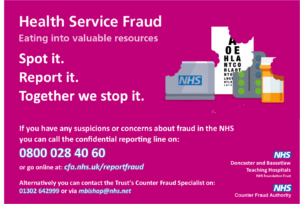Spot it and report it so that together we can stop it!
Fraud is defined as a criminal deception committed by a person who acts in a false and deceitful way. There are a string of offences under a variety of legislation and essentially the suspect will demonstrate some form of dishonesty and/or deception. By ‘NHS fraud’ we mean any fraud, within which we include bribery and corruption where the NHS is the victim. Our Chief Executive has issued a separate statement on bribery which can be viewed here.
While those who commit fraud against the NHS are a small minority, their actions have a serious impact on us all as it takes away vital resources intended for patient care. Watch the short video below for an outline of the impact of NHS fraud:
Fraud against the NHS takes many forms; here are just a few other examples:
- False claims – This can range from patients claiming for free treatment when they are not entitled to it, to NHS professionals claiming money for services they have not provided.
- Procurement fraud – This relates to frauds involving the purchasing of goods and services by an NHS organisation.
- Misrepresentation of qualifications or experience – This occurs when someone applying for a job claims to have qualifications or experience they do not actually have. This is particularly serious if it occurs in senior and medical positions.
- Sickness Absence Fraud – This happens when a staff member works for a secondary employer whilst on sick leave with the NHS and falsely claims they are unfit for work.
- Timesheet fraud – This happens when staff falsify their timesheets, for example to obtain payment for hours they have not actually worked
For more information on the various types of NHS frauds please refer to the NHS Counter Fraud Authority (NHSCFA) NHS Fraud Reference Guide.
The NHSCFA was set up to oversee work to prevent and detect fraud within NHS systems and build a culture intolerant to fraud across NHS bodies. More information about the work of the NHSCFA can be found by going to their website here.
The Trust has a robust policy in place in regard to fraud, bribery and corruption, which can be viewed online here. We also employ a Local Counter Fraud Specialist who is accredited by the NHSCFA to deal with reports of any suspicions of fraud. All referrals will be professionally investigated and treated with the utmost confidentiality.
If you have any concerns about fraud taking place within the Trust there are several ways that you can contact our Local Counter Fraud Specialist:
- By email to: nlg-tr.counterfraudplus@nhs.net
- By telephone: 01302 642999
- By post to the: Counter Fraud Office, D Block, Doncaster Royal Infirmary, Armthorpe Road, Doncaster, DN2 5LT
You can also make a confidential or anonymous report to one of the following:
- The NHS Fraud and Corruption Reporting Line on: 0800 028 40 60 (operated 24/7 by Crimestoppers)
- cfa.nhs.uk/reportfraud


Content out of date? Information wrong or not clear enough? Report this page.
